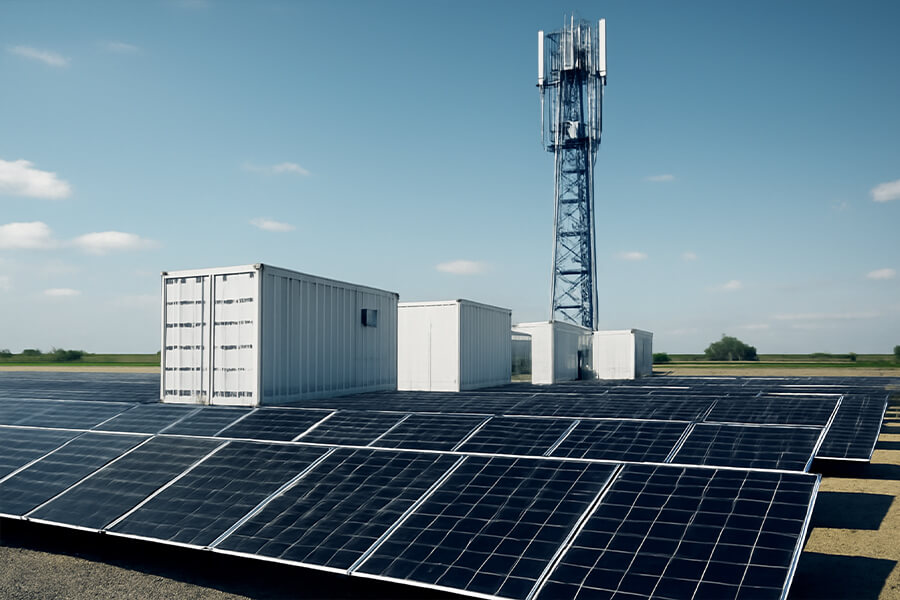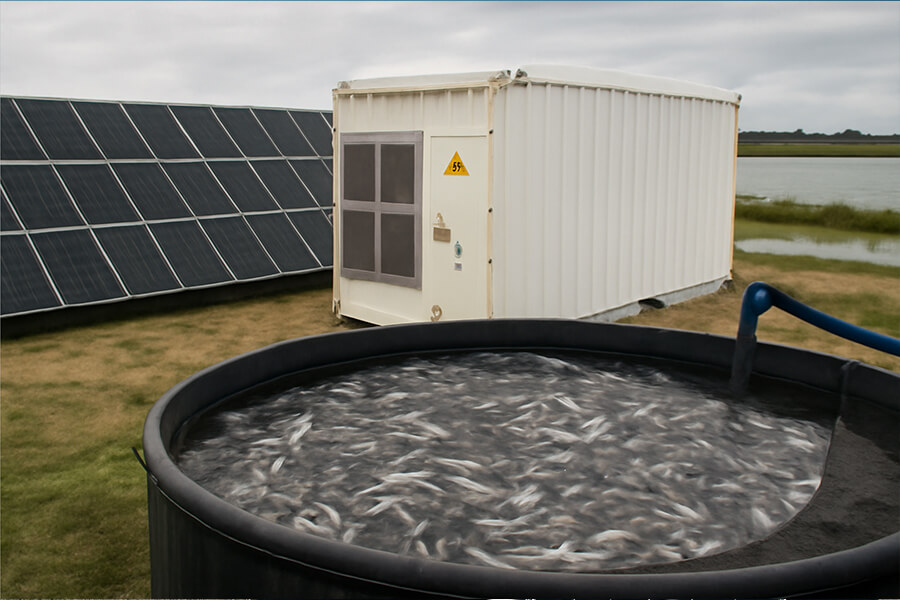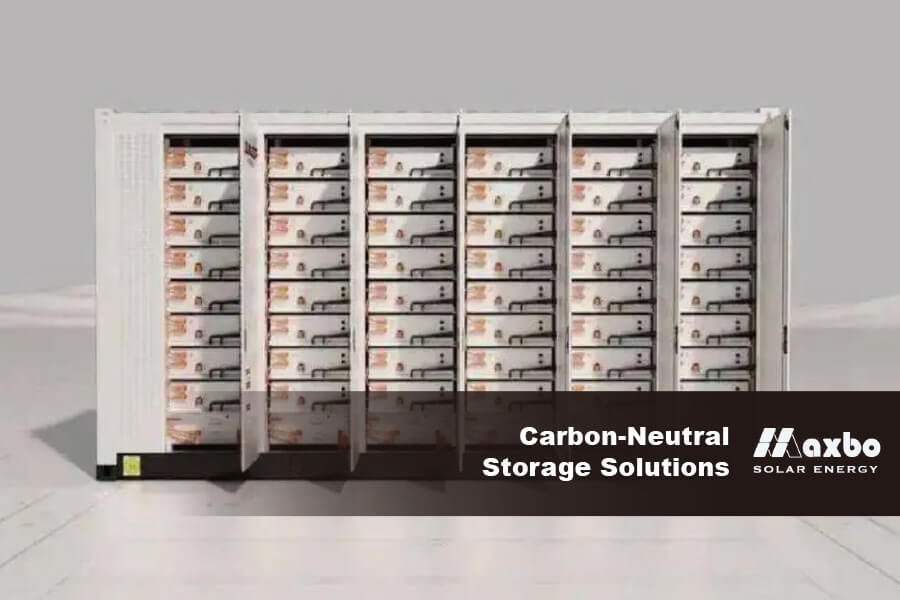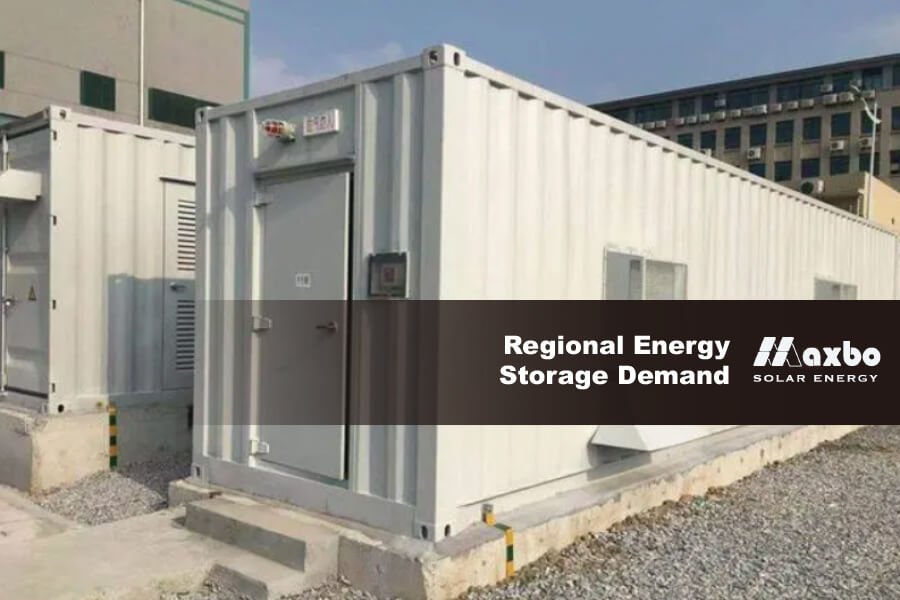Unlock the Potential of 100kW Battery Storage: Your Comprehensive Guide to Cost, Design, and Selection
In an era of rising energy costs and increased focus on sustainability, investing in a 100kW battery storage system is a smart move for businesses and large residential properties. A 100kW system not only enhances energy efficiency but also provides stability and cost savings. At Maxbo Solar, we specialize in offering advanced 100kW battery storage solutions tailored to meet diverse needs. This comprehensive guide will help you understand the key aspects of 100kW battery storage systems, including design considerations, budget estimates, and selection tips to ensure you make an informed decision.
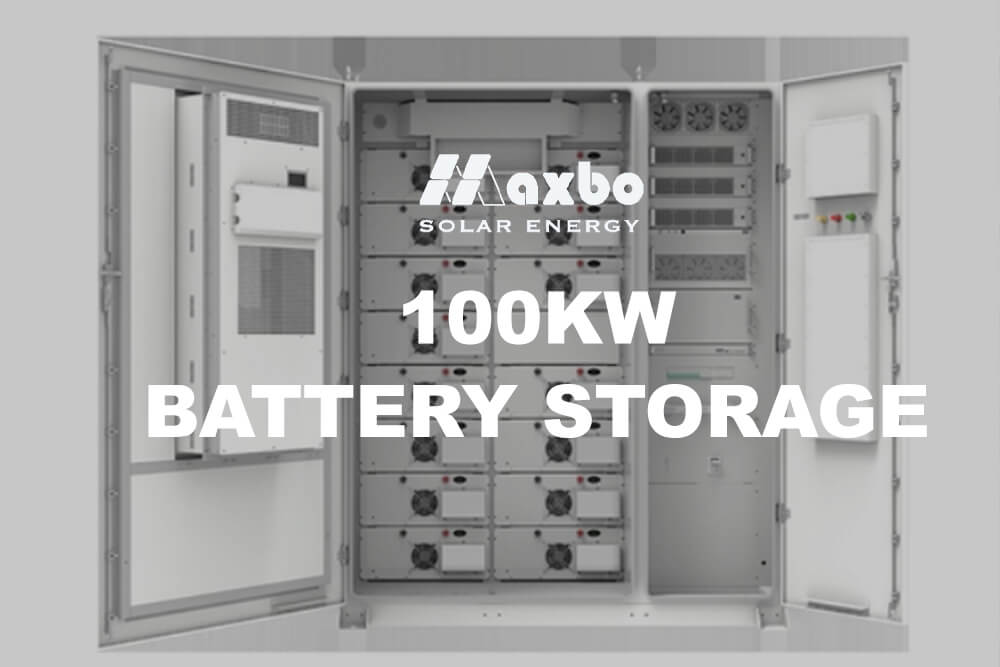
Table of Contents
ToggleKey Components and Design of a 100kW Battery Storage System
A 100kW battery storage system consists of several critical components. Understanding each part’s role and how they work together is essential for maximizing performance and reliability.
1. Battery Modules
- Purpose and Function: Battery modules are the core of the storage system, storing energy for later use. For a 100kW system, you’ll need a configuration of battery modules that can collectively deliver 100kW of power.
- Types: Lithium-ion batteries are the most common choice due to their high energy density, longer lifespan, and efficiency. Lead-acid batteries are also available but typically offer lower performance.
- Considerations: Battery modules should be chosen based on capacity, efficiency, and the expected lifespan to ensure that they meet your power and energy requirements effectively.
- Reference: Energy Storage Association: Battery Technologies
2. Battery Management System (BMS)
- Purpose and Function: The BMS ensures the battery operates within safe parameters, managing charging and discharging processes, balancing cells, and preventing overcharging.
- Features: Modern BMS units include advanced features such as thermal management and real-time performance monitoring, which help in maintaining battery health and performance.
- Considerations: A sophisticated BMS can enhance the lifespan and efficiency of your battery system, reducing the risk of failures and increasing overall reliability.
- Reference: National Renewable Energy Laboratory: Battery Management Systems
3. Inverter/Converter
- Purpose and Function: The inverter/converter converts DC power from the batteries to AC power for use by electrical devices. It also manages the power flow between the battery system, the grid, and your electrical load.
- Types: Options include string inverters, central inverters, and hybrid inverters. The choice depends on your specific application needs and system configuration.
- Considerations: An appropriately sized inverter is crucial for ensuring optimal performance and efficiency. It should match or exceed the power rating of the battery storage system.
- Reference: Solar Energy Industries Association: Inverters
4. Energy Management System (EMS)
- Purpose and Function: The EMS optimizes the energy storage and usage by managing when to store energy, when to release it, and how to interact with the grid.
- Features: Includes load forecasting, energy scheduling, and integration with renewable sources. This helps in maximizing savings and ensuring energy availability.
- Considerations: An efficient EMS can significantly enhance the performance and return on investment of your battery storage system.
- Reference: Green Tech Media: Energy Management Systems
5. Enclosure and Cooling System
- Purpose and Function: The enclosure protects the battery modules and other components from environmental conditions, while the cooling system maintains optimal operating temperatures.
- Features: Includes ventilation or active cooling mechanisms, especially for larger installations.
- Considerations: Proper space planning and cooling are vital for maintaining system efficiency and preventing overheating, which can lead to premature system failure.
- Reference: IEEE Spectrum: Battery Storage Systems
Budget Range for 100kW Battery Storage Systems
The cost of a 100kW battery storage system can vary widely based on the components and features you choose. Here’s a breakdown of typical budget ranges:
1. Standard Lithium-Ion System: $120,000 – $160,000
- Components: Includes standard lithium-ion batteries, basic BMS, and a standard inverter.
- Features: This budget range is suitable for general applications and offers good performance and reliability.
- Reference: Energy Storage Association: Cost Factors
2. High-Performance Lithium-Ion System: $160,000 – $220,000
- Components: Features high-efficiency lithium-ion batteries, advanced BMS, and a high-performance inverter.
- Features: Enhanced efficiency, longer lifespan, and additional features like advanced monitoring and cooling systems.
- Reference: BloombergNEF: Advanced Battery Storage Costs
3. Custom-Made Solutions: $220,000 – $350,000
- Components: Tailored battery modules, bespoke BMS and EMS, custom enclosures, and specialized cooling systems.
- Features: Fully customized solutions designed to meet specific energy needs and integrate seamlessly with existing systems.
- Reference: Greentech Media: Custom Battery Solutions
How to Choose the Right 100kW Battery Storage System
Selecting the right 100kW battery storage system involves several key considerations. Here’s a step-by-step guide to help you make the best choice:
1. Determine Your Energy Needs
- Assess Peak Loads: Identify your peak power demands and overall energy consumption. This will guide you in selecting a system that meets your specific needs.
- Consider Usage Patterns: Analyze your energy usage patterns to determine how often and for how long you will need to draw from the battery system.
2. Evaluate Battery Types
- Lithium-Ion vs. Lead-Acid: Lithium-ion batteries are generally preferred due to their higher efficiency and longer lifespan. However, lead-acid batteries might offer a more cost-effective solution for certain applications.
- Capacity and Efficiency: Choose batteries with a suitable capacity and efficiency rating for your specific energy needs.
3. Select an Inverter and BMS
- Match Power Ratings: Ensure that the inverter and BMS you choose are compatible with your battery system’s power rating and capacity.
- Advanced Features: Look for inverters and BMS with advanced features that can enhance system performance and provide better monitoring and control.
4. Plan for Space and Cooling
- Installation Space: Ensure you have adequate space for installing the battery modules, inverter, and cooling systems. Proper space planning is essential for efficient operation and maintenance.
- Cooling Requirements: Select a cooling system that prevents overheating and maintains optimal performance.
5. Set a Realistic Budget
- Budget Constraints: Align your budget with the type of system you need. Consider both upfront costs and long-term maintenance expenses.
- Cost vs. Benefits: Evaluate the cost in relation to the benefits provided by the system, including energy savings, reliability, and efficiency.
6. Consult with Professionals
- Expert Advice: Engage with energy storage professionals to help design and customize your system. Their expertise can ensure that all components work together seamlessly and meet your specific requirements.
- Reference: National Renewable Energy Laboratory: Consulting Services
Maxbo Solar’s 100kW Battery Storage Solutions
At Maxbo Solar, we offer a range of 100kW battery storage solutions designed to cater to various needs and budgets. Our systems are customizable, allowing you to select components and configurations that best suit your specific requirements.
Custom Battery Storage Solutions
We provide tailored 100kW battery storage systems to meet your unique energy needs. Whether you need a basic setup or a high-performance system, we can help you create the perfect solution. Explore our custom energy storage systems to get started.
Pre-configured Systems
For those who prefer a ready-to-install solution, we offer pre-configured 100kW battery storage systems optimized for various applications. Visit our services page to learn more about our offerings and find the ideal system for your needs.
Conclusion
Investing in a 100kW battery storage system is a strategic decision that can enhance your energy efficiency, reliability, and cost-effectiveness. By understanding the design, budget options, and selection criteria, you can make an informed choice that aligns with your energy goals. At Maxbo Solar, we are committed to providing high-quality battery storage solutions tailored to your needs. Explore our custom and pre-configured solutions today and take the next step towards a more sustainable energy future.
For personalized assistance or additional information, feel free to reach out to us through our website. Let’s work together to power your energy future!
References:
- Energy Storage Association: Battery Technologies
- National Renewable Energy Laboratory: Battery Management Systems
- Solar Energy Industries Association: Inverters
- Green Tech Media: Energy Management Systems
- IEEE Spectrum: Battery Storage Systems
- Energy Storage Association: Understanding Energy Capacity
- Clean Energy Reviews: Power Rating Calculations
- Solar Power World: Inverter Sizing Guide
- Battery University: Space and Cooling
- International Electrotechnical Commission: Battery Storage Safety
- Energy Storage Association: Cost Factors
- BloombergNEF: Advanced Battery Storage Costs
- Greentech Media: Custom Battery Solutions
- U.S. Department of Energy: Energy Needs Assessment
- Clean Energy Reviews: Battery Types
- Energy Storage News: Choosing Inverters
- Battery University: Installation Space
- Solar Power World: Budgeting for Battery Storage
- National Renewable Energy Laboratory: Consulting Services
Related Solutions
Related Blogs
BESS Container Telecom Edge Power: Deploy 5G Towers & Data Centers Off-Grid (No Diesel Tantrums!)
行政2025-07-11T17:04:49+08:00July 11th, 2025|Categories: Design, News|
BESS Container Fish Farm Heroes: Stop Fish Fainting During Grid Meltdowns
行政2025-07-11T17:04:35+08:00July 11th, 2025|Categories: Design, News|
Let’s Make Things Happen
Add notice about your Privacy Policy here.
Let’s Make Things Happen
”The Maxbo team of sales consultants will continue to enrich our own expertise and experience to empower the development of sustainable energy with rigor.“
Maxbo CEO
You will need to provide: 1. the amount of electricity used. 2. the type and power of the load. 3. the electricity consumption habits (daytime/nighttime consumption). 4. the need to store electricity. 5. the need to feed electricity to the mains. 6. drawings or address of the installation site. 7. other special requirements
We can provide you with a quotation, a specification for all products, a circuit connection diagram and a diagram of the installation and placement of the PV panels. Any other requirements and adjustments needed can be discussed with our team.
We can meet the needs of most scenarios, whether your application is for domestic, commercial and industrial use, in remote areas, or for grid-level energy storage, we have experienced colleagues to design and deliver the right solution.
Add notice about your Privacy Policy here.
How much solar power do I need?
Most homes need 5–12kW, depending on your energy use and location.
Off-grid vs. grid-tied — what’s the difference?
Off-grid works without the utility grid; grid-tied lets you sell extra power back.
Do I need permits?
Usually yes — check local rules or ask us for guidance.
How long does a battery last?
Depends on size and load. A 5kWh battery can power a fridge for about 40 hours.
Can I upgrade my system later?
Yes, our systems are modular and easy to expand.
Does Maxbo offer installation?
We ship globally and connect customers with trusted local installers.

